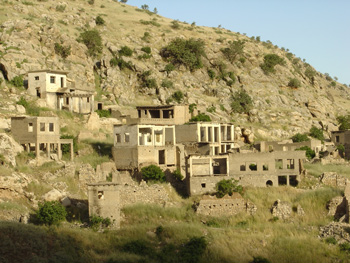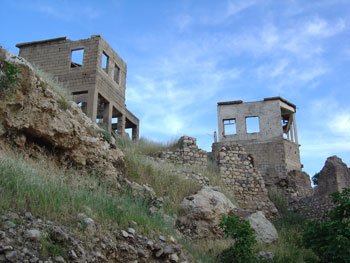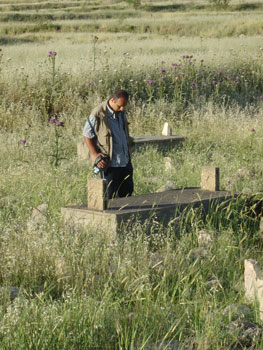Back to Hassana
nala4u / shlama.be

Ruins of Hassana 2004
Turkey. July 13, 2001
It is deathly quiet and terribly hot amidst the blackened walls of the ruined houses. I can smell the stench of ashes in the narrow streets and in the scorched gardens at the edge of the village. Rats zigzag on the terrace of the Turkish karakol; the small school next to it looks like a hollow carcass. I climb over heaped up rubble to what is left of the Mart Shmuni church in Upper Hassana. Swarms of flies are buzzing in the empty church
On the way back I put a new film in my camera and take the last pictures. I turn the hired Turkish Fiat and start manoeuvring over the gravel trail towards the plain and the main road Cizre-Silopi. It happens close to the ruins of the Kurdish hamlet of Dadar: a dark blue armoured car blocks the road; Turkish soldiers in full battle dress point their arms. It is a strange sight, all those Rambo-types with dark sunglasses against one unarmed foreigner. Two soldiers take place in the back of my car and order me to follow the armoured vehicle to the military base in Silopi. It is 4 o’clock in the afternoon
Flanders. July 1983
I pass my summer holidays in a cottage in the woods. Rain keeps falling down all night while I am reading the autobiographical novel Sentimental Journey by the Jewish-Russian writer Viktor Shklovsky (1). At the end of the First World War he serves in the Russian army in the Urmia region, NW Persia, and he mentions the smallest allies of the Russians and the British in their warfare against the Turks. He calls these Christian auxiliary troops Aissors, the Armenian designation for Assyrians
Assyrians? I thought these fierce warriors had all perished in ancient times BC when their capital Nineveh in northern Mesopotamia was destroyed by Babylonians and Medes. Shklovsky explains the origin of his Aissors. This isolated Christian minority speaks a modern form of Aramaic, the language of Christ, and they consider themselves direct descendants of the ancient Assyrians. Shklovsky also describes their awful exodus in the summer of 1918, when the Russians have retreated from Persia and the leader of the Assyrian Christians, patriarch Mar Shimun Binyamin, is ambushed and murdered by the treacherous Kurdish chieftain Simko. The whole Assyrian population flees from Urmia and thousands of them, elderly people, women and children, are slaughtered by Turks, Kurds and Persians on their long march towards the British, who finally take the survivors to the refugee camp of Baquba, north of Baghdad
Shklovsky’s Sentimental Journey leaves a deep impression: the tragic end of a small people, betrayed and lost in the general turmoil of the World War, keeps smouldering in a corner of my memory
Mechelen. Autumn of 1998 and beyond
I read a headline in a local newspaper: Children of Assyrian Turks Not Accepted in Primary Schools. The article deals with the complaints of Christian refugees from a village in SE Turkey, who protest against discrimination. Assyrian – this is something I want to puzzle out. At the local department for refugees I get the address of a certain Melkan, one of the younger spokesmen of this newly arrived group of asylum seekers in Mechelen. He is fluent in Dutch and he tells me about his village: Hassana
Assyrian history links our souls; we become friends and he guides me through his community in Mechelen. In the spring of 2000 we start the interviews with the Hasnaye, who put their village on the map for me. I filter the oral stories and connect them with historical sources and with my travel experiences in SE Turkey. In this way I finish the monograph Mechelen aan de Tigris in Dutch (2). Yet there is something missing: pictures from Hassana in its present state. Melkan was only ten when he arrived in Belgium; nostalgic feelings keep haunting his soul. We plan our voyage to his native soil
Turkey. May 2001

Hassana – stone skeletons
It rains. The brown-red waters of the river Tigris swirl along the broad banks at Cizre. The main road leads to the smaller city of Silopi, close to the Iraqi border. In the city hall we are received by the vice-governor of the district. His verdict is final: Melkan may go to his village if the military authorities in control of the area agree to it; a foreigner however has nothing to look for there. Over and out. I take my leave and travel back; Melkan stays in Silopi and negotiates with the Turkish commander in the army barracks
The next day, a Sunday, a military convoy leaves Silopi and turns off to Hassana. An armoured car in front flattens the trail for the jeep with the commander and Melkan, and for a platoon of soldiers, who follow in army trucks. They reach Hassana. It is a sad sight: the gardens are completely wasted, weeds are growing high in the streets and heaps of rubble block the way. The soldiers stay on guard while Melkan enters the ruins of his house of birth. He picks some wild flowers nearby; he finds some crumbled prayer books on the floor of the Protestant church in Lower Hassana; he goes to the small mountain river that runs from Judi to the plain and fills a couple of plastic bottles with water from Hassana. Then the commander gives the order to leave the place.
Back in Mechelen. Melkan has been the first one to return to the village and the news has quickly spread among the Hasnaye. They all come to his house, even from Sweden and Holland and other places in Europe, just to taste the water of Hassana. Melkan’s father asks about photographs from the village. There are none, it was forbidden
Turkey. July 2001
I am on my way back from the Urmia region in Iran. I stayed in the country house of the Assyrian singer Violet S in Khosrawa (Salmas); she brought me to the place, Kohna Shahr, where patriarch Mar Shimun was murdered by Simko, chieftain of the Shakak Kurds, in 1918
I cross the Iranian-Turkish border and I rent a car in the city of Van. The next day I ride to the south through the mountains. A difficult journey: I have to explain over and over again at military checkpoints why I am driving there. Just tourism, what else can I say? At last I pass through the military stronghold of Shirnak and finally descend to the Bohtan plain where the Tigris flows. I leave Cizre behind me and head east, towards Silopi. It is high noon under a burning sun; the green landscape of May has changed into a yellow desert. I find the side-road that leads to Hassana. A lonely car in a cloud of dust
Turkey. July 13, 2001
My car is standing on the courtyard of the Silopi army barracks and soldiers are searching my luggage. They find a copy of the monograph Mechelen aan de Tigris. A bit later I have to explain in the commander’s office the purpose of my sneaking into a forbidden military zone. The commander speaks English and French and I decide to stick to the simple truth: I have written that book about the Hasnaye, now living in Mechelen, Belgium, and I just wanted to take pictures in Hassana, as a kind of memento for them. The commander shakes his head. He remembers one of these Süryanî (Assyrian Christians), a young man, who he brought to the village just two months ago, but , as a much older person and a writer, I should have known that taking pictures in a military zone is strictly forbidden
I open my camera and hand over the film. No more pictures here? I truthfully confirm this: I have left the used roll somewhere else, in the car. The commander starts talking about that dump Silopi and about his hope of getting stationed elsewhere soon. My own future looks brighter when I sign the official document, stating that the Belgian lecturer and writer who had been arrested in Hassana was released again after handing over a book in Dutch language and a film to the military authorities for further investigation
It is 8 o’clock in the evening. I am driving towards the western sunset. With 24 pictures of a ruined Assyrian village at Mount Judi well hidden on a small roll of black celluloid
Mechelen. April 2004
In Melkan’s house in Mechelen we have often recalled that moment when the 24 colour-slides, the first pictures of Hassana after its evacuation, were projected on the screen. The large darkened room was crammed with Hasnaye and they all watched in silence. Suddenly Ishak, Melkan’s father, left and went to the garden behind the house. “Just leave him,” Melkan whispered. ,He has dreamed too long about returning, now he knows how bad it is
Later on, in the summer of 2003, Melkan comes to my place with a videotape. It is sent from Turkey by his father, who is on holiday there. Iraq is liberated from Saddam’s yoke and in SE Turkey the Turkish army has loosened its grip. We see Ishak smiling all over on the screen. Kurdish friends from Silopi have told him that he can come over. And there he is on that video, sitting on a tractor and then walking through the ruins of Hassana. Look Melkan, he shouts at the eye of the camera, soon I will grow my own tomatoes and pomegranates here! The gardens of Hassana still lie waste, but at least they haven’t been scorched as before. Hassana is no longer off limits, so it seems

Melkan at Hassana graveyard 2004
A new spring is coming. Melkan and I bend over the map of SE Turkey. In May 2004 we will return to the Judi area and this time we will go all the way, from Hassana in the foothills to Noah’s Ark on the summit. Such is the vision we share. In many Assyrian families in Mechelen at least one member is now planning a visit, if only to find out what has happened to the family land. And maybe also to check out the possibility of rebuilding the family home into a cottage or country house. Belgian winters in Mechelen and Assyrian summers in Hassana – the true renaissance of Mechelen on the Tigris
Through its consecutive governments the Turkish Republic has made it clear that it wants to join the European Union. When will the negotiations start? Perhaps whenever Turkey rejects its heritage of militaristic kemalism and fully embraces democracy with respect for human rights and for the basic rights of all its minorities, including the smallest one: the Chaldean-Assyrian Christians (3). Whenever Turkey stops saying that those are happy in Turkey who have the privilege to call themselves Turks. Let us pray and keep our fingers crossed. Miracles may happen
NOTES
1Viktor Shklovsky, A Sentimental Journey: Memoirs 1917-1922 (Cornell University Press, 1984). Translated from the Russian original by Richard Sheldon
2August Thiry, Mechelen aan de Tigris (CIMIC-EPO, 2002), 192 p. with ill. & maps
3I was arrested in Hassana on July 13, 2001. Exactly one month earlier the Republic of Turkey released following press statement by Prime Minister Bülent Ecevit (June 13)
Turkish citizens of Assyrian origin who emigrated abroad on their own will as a consequence of intense terrorist activities in their region have reportedly been facing certain difficulties in returning to their homes in Turkey (…) It was also reported that they were not allowed to receive religious education and that foreigners were prevented from visiting Assyrian villages (…) Constitutional, legal and democratic rights of all Turkish citizens of Assyrian origin are under the full guarantee of the State. Our dear citizens who have settled in other countries for various reasons can return to our country and their villages without any difficulty or restriction. End of quotes and promises



